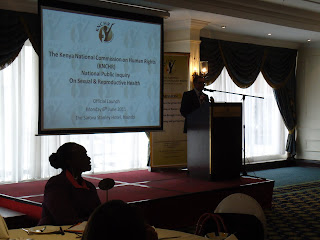 |
| Participants at the pre-hearing forum in Garissa |
For the past two months the inquiry team has crossed the country listening to evidence from Kenyans who have either fallen victim to or witnessed fellow Kenyans suffer various forms of sexual and reproductive health violations; both in and outside health facilities.
The first round of hearings began in Nairobi in early June, with the inquiry team moving to Mombasa the following week. Round two of the hearings in mid-July took the team to Kitale from where they proceeded to Kisumu. The team then embarked on round three of the hearings in late July, beginning in Embu and then proceeding to Garissa for the final hearings.
During the public hearings, the inquiry team received evidential information from close to 200 individuals, groups and institutions in the form of oral submissions and written memorandums. The team continues to receive written submissions up to today and will continue to receive them up to the end of August. Individuals and organisations wishing to contribute written submissions can find out more information here.
As the public hearings come to a conclusion, the inquiry team is organising a special forum to be held in Nairobi 23 - 25 August. This forum will bring together a wide range of experts in sexual and reproductive health issues with a view to shedding more light on some of the issues raised during the regional public hearings.
Recognising the right of response, the forum will also provide an opportunity for institutions and individuals adversely mentioned during the regional hearings to respond and state their positions before the inquiry team compiles the report on the findings and recommendations for publication and onward dissemination.



